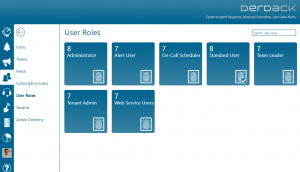A few days ago I had an insightful conversation with one of our customers who inspired me to write this blog. He, like so many other customers, was facing the problem that his Enterprise Alert management overhead was increasing with each new team he added, as he had been managing resources such as event sources, notification channels and alert policies for the new teams as well. His question to us, therefore, was whether he could not also put these management tasks in the hands of the teams.
The answer is yes.
Enterprise Alert provides the ability to assign specific user roles to users. These user roles contain a fixed list of permissions and are already created in the form of standard user roles during installation.
In order to be able to manage your own team, you only need to assign the user role “Team Leader” to the corresponding user and store it in the team as Team Manager. Now this user has the possibility to manage his team according to his own specifications. This included, among other things, the creation and editing of:
- Alarm policies and alarms
- Users, user profiles and user roles in the own team
of the own team - On-call schedules, on-call schedules, multi-team schedules
- Notifications and notification feeds
- Emergency alerts and remote actions
Enterprise Alert offers the possibility to edit, copy and create user roles from scratch, this allows the Enterprise Alert administrator to deny access to the system itself and to the system components and, depending on the customer’s own scenario and security requirements, to adjust these rights.
If you have licensed the tenancy capability of Enterprise Alert, the system also offers the role of “Tenant Admin”.
This user role enables a user to administer the entire tenant according to defined specifications – including all teams assigned to this tenant.
Summary
Enterprise Alert is a necessarily highly complex product, which offers you a variety of options for reliable and traceable alerting of users, teams and readiness. On a “small” scale, Enterprise Alert can easily be administered by one person alone, but as the installation grows, it eventually reaches the point where it makes little sense to bundle everything into one person. This is where Enterprise Alert offers them a way to delegate tasks to teams, both to reduce their own administrative overhead and to increase the agility of their teams.

